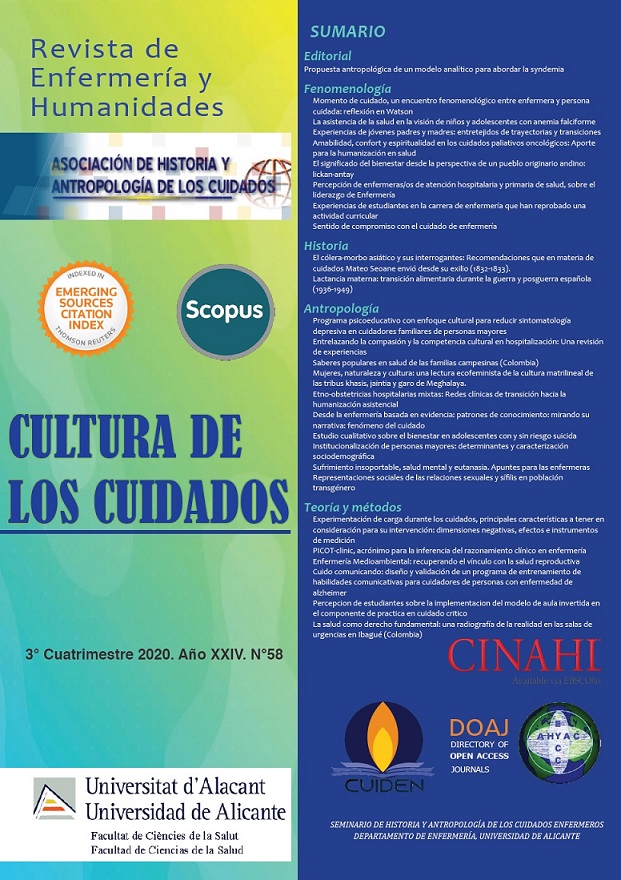Entrelazando la compasión y la competencia cultural en hospitalización: Una revisión de experiencias
DOI:
https://doi.org/10.14198/cuid.2020.58.13Palabras clave:
Competencia cultural, asistencia sanitaria culturalmente competente, enfermería transcultural, compasión, atención de enfermeríaResumen
El mundo globalizado actual expresa importantes desafíos para el cuidado de enfermería, de manera que se reconozca y alivie el sufrimiento teniendo en cuenta la cultura del sujeto de cuidado. Objetivo: Describir los hallazgos de investigaciones sobre experiencias de enfermeras de hospitalización con respecto a la compasión y el cuidado a personas culturalmente diversas. Método. Revisión sistematizada. Las búsquedas fueron realizadas en: Web of Science, CINAHL, OVID Nursing, Evidence Based Medicine Reviews, Medline (PubMed), PsycARTICLES, Biblioteca Virtual en Salud, CUIDEN Plus, TripDatabase, Epistemonikos y el Descubridor de la Universidad Nacional de Colombia. Se ejecutaron 83 búsquedas con términos MeSH, DeCS y lenguaje natural, incluyendo artículos de investigación o revisión con abordajes cualitativos, publicados en español, inglés o portugués. Resultados: Se incluyeron 42 estudios, con predominio de diseños fenomenológicos, etnográficos y de teoría fundamentada. Estos reflejan el vínculo entre compasión y el cuidado a personas culturalmente diversas, desarrollado a través de tres temas y 14 subtemas. Conclusión. Las experiencias de enfermeras y pacientes son diversas, pero es visible la conexión entre compasión y competencia cultural en el cuidado de enfermería en el ámbito clínico. Esta sistematización muestra necesidades de formación y entrenamiento, refleja tensiones entre cultura personal, profesional e institucional.Financiación
Beca Doctoral Convocatoria 647 del Departamento Administrativo de Ciencia, Tecnología e Innovación (COLCIENCIAS)Citas
Blomberg, K., Griffiths, P., Wengström, Y., May, C., & Bridges, J. (2016). Interventions for compassionate nursing care: A systematic review. Int J Nurs Stud, 62, 137-155. https://doi.org/10.1016/j.ijnurstu.2016.07.009
Consejo Internacional de Enfermeras. (2013). Declaración de posición del CIE. Competencia Cultural y Lingüística. Recuperado Mayo 01, 2016, de http://www.icn.ch/images/stories/documents/publications/ position_statements/B03_Competencia_cultural_linguistica-Sp.pdf
Crawford, P., Brown, B., Kvangarsnes, M., & Gilbert, P. (2014). The design of compassionate care. J Clin Nurs, 23(23-24), 3589-3599. https://doi.org/10.1111/jocn.12632
Drenkard, K. N. (2008). Integrating human caring science into a professional nursing practice model. Crit Care Nurs Clin N Am, 20, 403-414. https://doi.org/10.1016/j.ccell.2008.08.008
Douglas, M. K., Rosenkoetter, M., Pacquiao, D.F., Callister, L.C., Hattar-Pollara, M., Lauderdale, J., Milstead, J., Nardi, D., & Purnell, L. (2014). Guidelines for implementing culturally competent nursing care. J Transcult Nurs, 25(2), 109-21. https://doi.org/10.1177/1043659614520998
Garneau, A.B., & Pepin, J. (2015). Cultural Competence: A Constructivist Definition. J Transcult Nurs, 26(1), 9-15. https://doi.org/10.1177/1043659614541294
Grant, M. J., & Booth, A. (2009). A typology of reviews: an analysis of 14 review types and associated methodologies. Health Info Libr J, 26(2), 91-108. https://doi.org/10.1111/j.1471-1842.2009.00848.x
Heer, K., Rose, J., & Larkin, M. (2016). The challenges of providing culturally competent care within a disability focused team: A phenomenological exploration of staff experiences. J Transcult Nurs, 27(2), 109-16. https://doi.org/10.1177/1043659614526454
López, L. (2010). Los Saberes Culturales en Salud en un Mundo Glocalizado. Index Enferm, 19(2-3), 81-3. https://doi.org/10.4321/S1132-12962010000200001
Mareno, N., & Hart, P. L. (2014). Cultural competency among nurses with undergraduate and graduate degrees: Implications for nursing education. Nurs Educ Perspect, 35(2), 83-38. https://doi.org/10.5480/12-834.1
Mays, N., Pope, C., & Popay, J. (2005). Systematically reviewing qualitative and quantitative evidence to inform management and policy-making in the health field. J Health Serv Res Policy, 10 Suppl 1, 6-20. https://doi.org/10.1258/1355819054308576
Miller, J., Leininger, M., Leuning, C., Pacquiao, D., Andrews, M., Ludwig-Beymer, P., & Papadopoulos, I. (2008). Transcultural Nursing Society Position Statement on Human Rights. J Transcult Nurs, 19(1), 5-7. https://doi.org/10.1177/1043659607309147
Milton, C. L. (2016). Ethics and Defining Cultural Competence: An Alternative View. Nurs Sci Q, 29(1), 21-23. https://doi.org/10.1177/0894318415614624
Papadopoulos, I. (2018). Culturally Competent Compassion: A Guide for Healthcare Students and Practitioners. United Kingdom: Routledge. 130 p. https://doi.org/10.4324/9781315560984
Papadopoulos, I., & Ali S. (2016). Measuring compassion in nurses and other healthcare professionals: An integrative review. Nurse Educ Pract, 16(1), 133-9. https://doi.org/10.1016/j.nepr.2015.08.001
Reina-Leal L. M. (2018). Competencia cultural y compasiva en enfermería: de regreso a la esencia del cuidado. Enfermería Comunitaria; 14. Recuperado Diciembre 01, 2018, de http://ciberindex.com/c/ec/ e12090
Robertshaw, L., Dhesi, S., & Jones, L. L. (2017). Challenges and facilitators for health professionals providing primary healthcare for refugees and asylum seekers in high-income countries: a systematic review and thematic synthesis of qualitative research. BMJ Open, 7, e015981. https://doi.org/10.1136/bmjopen-2017-015981
Schantz, M. L. (2007). Compassion: A concept analysis. Nurs Forum, 2007, 42(2), 48-55. https://doi.org/10.1111/j.1744-6198.2007.00067.x
Sinclair, S., Beamer, K., Hack, T. F., McClement, S., Raffin Bouchal, S., Chochinov, H. M., & Hagen, N. A. (2017). Sympathy, empathy, and compassion: A grounded theory study of palliative care patients' understandings, experiences, and preferences. Palliat Med, 31(5), 437-447. https://doi.org/10.1177/0269216316663499
Sinclair, S., Norris, J. M., McConnell, S. J., Chochinov, H. M., Hack, T. F., Hagen, N. A., McClement, S., & Bouchal, S. R. (2016). Compassion: a scoping review of the healthcare literature. BMC Palliat Care, 15, 6. https://doi.org/10.1186/s12904-016-0080-0
Taylor, G., Papadopoulos, I., Dudau, V., Maerten, M., Peltegova, A., & Ziegler, M. (2011). Intercultural education of nurses and health professionals in Europe (IENE). Int Nurs Rev, 58(2), 188-95. https://doi.org/10.1111/j.1466-7657.2011.00892.x
The Joint Commission. (2010). Advancing Effective Communication, Cultural Competence, and Patient- and Family-Centered Care: A Roadmap for Hospitals. Oakbrook Terrace, IL: The Joint Commission. Recuperado Mayo 05, 2016, de http://www.jointcommission.org/assets/1/6/ ARoadmapforHospitalsfinalversion727.pdf
Tong, A., Flemming, K., McInnes, E., Oliver, S., & Craig, J. (2012). Enhancing transparency in reporting the synthesis of qualitative research: ENTREQ. BMC Med Res Methodol, 27(12), 181. https://doi.org/10.1186/1471-2288-12-181
Vouzavali, F. J., Papathanassoglou, E. D., Karanikola, M. N., Koutroubas, A., Patiraki, E. I., & Papadatou,
D. (2011). 'The patient is my space': hermeneutic investigation of the nurse-patient relationship in critical care. Nurs Crit Care, 16(3), 140-51. https://doi.org/10.1111/j.1478-5153.2011.00447.x
Whittemore, R., Chao, A., Jang, M., Minges, K. E., & Park, C. (2014). Methods for knowledge synthesis: an overview. Heart Lung, 43(5), 453-61. https://doi.org/10.1016/j.hrtlng.2014.05.014
Descargas
Estadísticas
Publicado
Cómo citar
Número
Sección
Licencia
Derechos de autor 2020 Liliana Marcela Reina-Leal, Lucero López-Díaz

Esta obra está bajo una licencia internacional Creative Commons Atribución 4.0.






